US veterans are more likely to end up in prison than civilians. These horses might help them
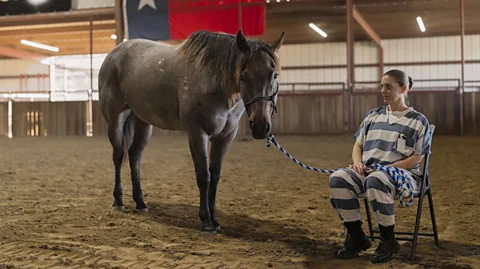 Ilie Mitaru
Ilie MitaruNearly one third of the US's war veterans have been arrested or jailed at some point in their lives – a new programme using horse-therapy is attempting to tackle the underlying trauma they have suffered.
Two dozen men and women are leaning against the iron bars of a round pen, peering in. They've all been freed from their jail cells for the morning.
The heat of the Texan sun beats through the roof above as an instructor, Pat Puckett, shows one member of the group how to do something they’ve never done before: put a bit into a horse’s mouth.
The student nervously tries to follow Puckett's instructions, but the horse does not relent, rejecting the bit and pulling his head away. After a few failed attempts, the instructor takes the bit from the flustered student, motioning for him to step back from the agitated animal.
"Horses," says Puckett, addressing everyone present, "are sensitive. People are not. We'll never be as sensitive as a horse – but we can try."
Trigger warning
This article contains graphic descriptions of violence that some readers may find upsetting.
All of Puckett's students here are inmates serving time at Collin County Jail, just north of Dallas, Texas. They are also all military veterans taking part in a pioneering US programme to bring horse-assisted, also known as equine therapy, to incarcerated veterans.
Seasoned horse trainer Puckett, 75, is a veteran, too. He was drafted into the US army as a teenager and served two years in artillery during the Vietnam War.
"It's been 50 years since I was in Vietnam," Puckett tells me later. "I get sad every day. If I think about one single thing, I remember the smell of guts. You never lose the smell of a human's guts. As soon as I started cowboying, I put something positive in front of those thoughts. But I'll never, ever, ever forget it."
The Veterans Accessing Lifelong Opportunities for Rehabilitation (Valor) programme, established in 2018, currently works with roughly 40 veterans from across Texas. It provides a range of services including mental health counselling and group counselling for anger management as well as support groups for veterans with combat-related Post-Traumatic Stress Disorder (PTSD).
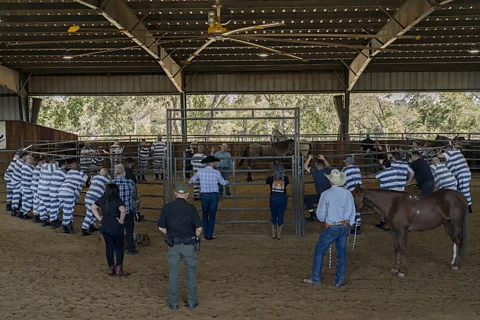 Ilie Mitaru
Ilie MitaruThose who run Valor say they want to address disparities in incarceration rates between civil and veteran populations. Those disparities are stark: around 8% of prisoners in the US are veterans. In 2016, the most recent data available, 107,000 veterans are imprisoned in the US. And nearly one third of the country’s war veterans have at some point in their lives been arrested or jailed – nearly double the rate among civilians.
"One of the things about a veteran is that when you leave the tribe, not everybody deals with it the same way," says Collin County Sheriff Jim Skinner, who runs Valor. "Some people are okay with it, some people will just move on, but others don't."
Skinner is also a veteran who found relief from the stresses of service by spending time with his own horses. That’s what sparked the idea for Valor in the first place.
He knows that struggling veterans can find themselves in difficult situations. Some turn to drugs or alcohol to cope, adds Skinner: "They're anxiety-ridden, they make bad choices and they end up in jail. Then, ultimately, they end up here with me."
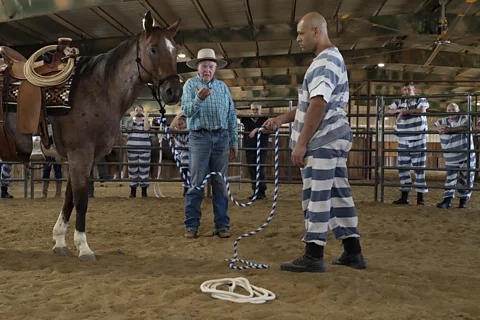 Ilie Mitaru
Ilie MitaruOne of the inmates watching Puckett's demonstration is Jeffrey Philips. "You don't have to go to war and be boots-on-the-ground with a machine gun killing everybody just to get PTSD," he tells me later. Philips served five years in the Navy on two anti-piracy missions around the horn of Africa. But he attributes his PTSD to experiences outside his deployments.
During military training, he says his friend was killed and set on fire by a fellow recruit. Later, shortly after Philips left the military, two of his close friends took their own lives, which he says led him to drink excessively. Philips was arrested multiple times for driving under the influence of alcohol. While in jail, he was referred to the Valor programme.
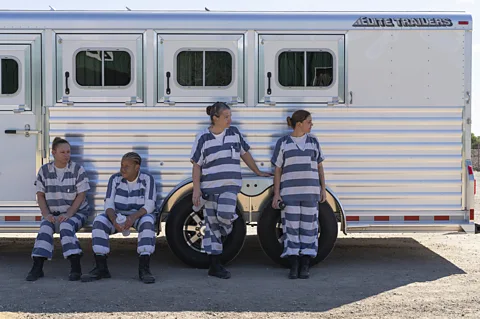 Ilie Mitaru
Ilie MitaruHorse-assisted therapy has gained traction within correctional institutions across the US in recent decades. The earliest such programme began in Colorado during the 1970s. It eventually became known as the Wild Horse Inmate Programme, which partners with the Bureau of Land Management and tasks inmates with training wild horses. Other, similar programs have emerged in prisons and jails across the country, but Valor is one of the few that works solely with incarcertated military veterans.
A growing body of research on the efficacy of these programmes suggests that equine therapy offers a host of psychological and behavioural benefits for veterans, including increased self-esteem and compassion, improved emotional regulation and reduced stress.
There are also some studies elsewhere in the world that indicate horse-therapy can help reduce reoffending by developing empathy, self-esteem alongside a sense of hope and belonging among prisoners.
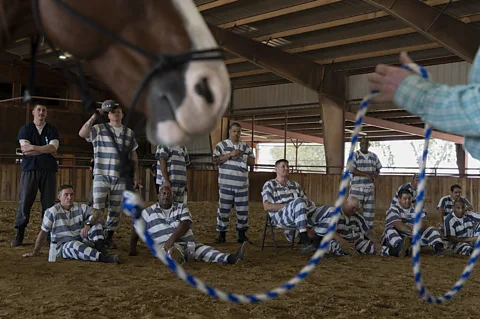 Ilie Mitaru
Ilie MitaruFor Skinner, equine therapy is "perfect" for veterans because it also appears to be effective at reducing anxiety and PTSD. "It's that unbelievable level of anxiety that so many of the veterans that we see in custody carry with them on a daily basis," he says.
Those taking part in the programme currently attend five days of horse training workshops run by Puckett before progressing into two months of weekly therapy sessions with the animals, culminating in a celebratory trail ride for the graduating inmates. Skinner and his team are also building permanent stables to operate from as the programme scales up.
Puckett says he has spent much of his life "cowboying" across the American West. He has taught horse training around the world and says he feels a deep obligation to his fellow veterans. He tries to accommodate the unique challenges they face.
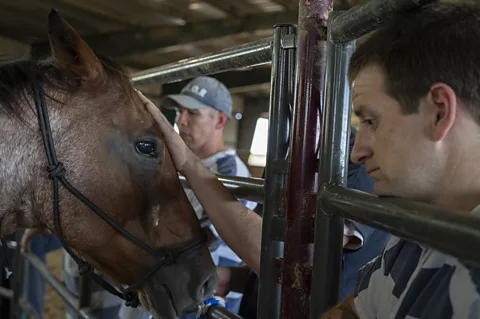 Ilie Mitaru
Ilie MitaruPuckett has built a reputation as an expert in a specific form of horse training, colloquially known as "natural horsemanship", which emphasises cooperation with the animal versus domination over it.
The idea is to recognise that horses, much like dogs and cats, have lived alongside humans for thousands of years and are capable of understanding and executing a task without the need for force, or the threat of force. To the untrained eye, mastering cooperative control of a horse can appear almost mystical. The human manages to convey barely perceptible commands while the horse, seemingly innately, responds on cue.
For this to work, the human must remain calm and self-regulated at all times. This can be extraordinarily difficult for anyone struggling with a dysregulated nervous system caused by the effects of trauma, says Puckett.
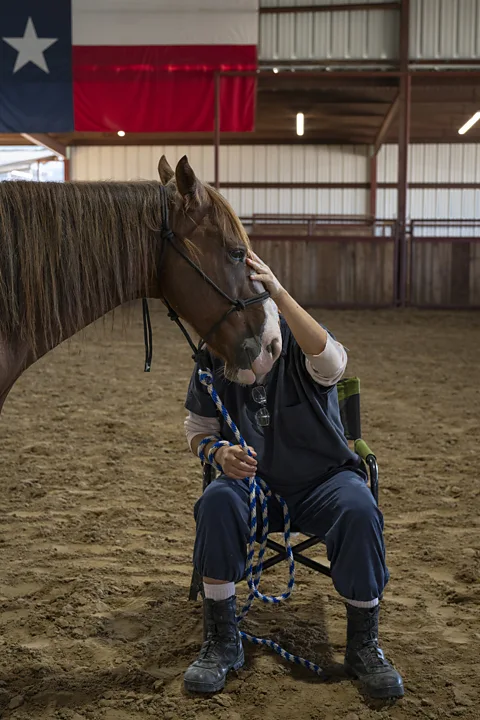 Ilie Mitaru
Ilie MitaruAshley Davis, another inmate present for the Valor workshop today, was employed as an emergency nurse after serving in the Navy.
"Working with the horses has helped me recognise when I'm starting to struggle and it's helping me understand that I have to regroup. I got to breathe, I got to centre myself," she says. "It's giving me some tools in my toolbox that I can take with me to apply later so that I don't sabotage my life again."
Now, she stands in the middle of the round enclosure, face to face with a horse. Puckett tells her to relax and place her hand on the animal's head, resting her fingers between its giant eyes. The goal is to get the horse to feel safe enough so that it lowers its head in submission.
Davis takes deep, nervous breaths, exhaling very slowly. Several long, tense minutes pass. But Davis keeps her concentration, gradually gaining the animal’s trust. And then, in a moment, the horse yields – lowering its mighty head to the floor.
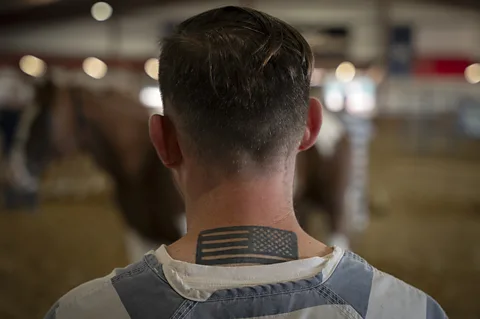 Ilie Mitaru
Ilie Mitaru--
If you liked this story, sign up for The Essential List newsletter – a handpicked selection of features, videos and can't-miss news, delivered to your inbox twice a week.
